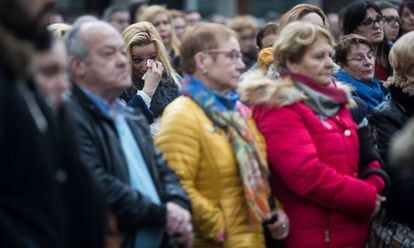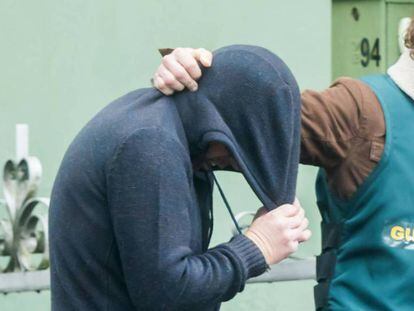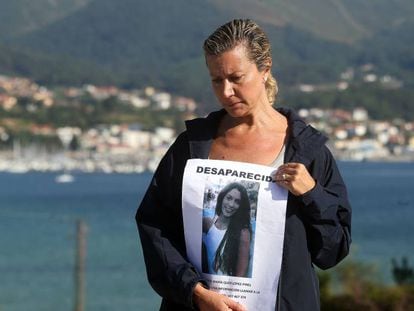The Galician town shaken by the Diana Quer case
Three days of mourning are declared in Rianxo as the facts surrounding the teen’s death come to light


On Christmas Eve, José Enrique Abuín, a small-time drug dealer who swapped cocaine for seafood and diesel trafficking, lost the game he had been playing for a year with the Civil Guard. It happened in Boiro, 14 kilometers from his home. In the early hours of the morning, Abuín slowed down his Alfa Romeo three times to invite as many girls for a ride. None of them accepted. This was around four in the morning. At 8pm on Christmas Day, Abuín tried again, but this time he was willing to do anything to get his way.
This time evil has called at our door Rianxo mayor Adolfo Muiños
In the center of Boiro, just 200 meters from town hall, he got out of his car with a kitchen knife and tried to pull a young woman into the trunk. The ensuing struggle and screams alerted a couple which turned the corner and saw the scene. The victim, from the trunk, warned the couple that he had a knife. She then jumped out of the car and began to run as the murderer of Diana Quer put his foot on the accelerator and drove off at full speed. His hours of freedom were numbered.
Two months ago, the journalist Javier Romero from La Voz de Galicia got this statement out of Abuín: “I am not going to talk, the Diana Quer case has ruined my life.” The Central Operative Unit (UCO) had conducted three rounds of special investigation into various suspects, including Abuín, identified by agents as El Chicle. They had interrogated him and his wife tirelessly. But Rosario García was impossible to break. According to her, Abuín was at home on the night that Diana Quer disappeared.
Of all the suspects, Abuín was always the one that popped up the most, and whose name was closest to coming out in the media. He was the “poacher” or the man “convicted of drug trafficking” which the media referred to every now and again.

But as well as his wife’s alibi, two additional circumstances made the investigation difficult. The first was El Chicle’s lack of intelligence: a man of limited abilities (a local resident of Rianxo described him this Monday with a very Galician expression: cara de papán or dimwit), a loudmouth with hang-ups who boasted about selling drugs and bought ridiculous luxury items when he made money from it. How could someone like this not make any mistake? A Civil Guard officer, not involved in the investigation, notes: “He was so stupid that it made him smart.”
The second reason was the enormous amount of resources that were spent on investigating the fairground workers who were operating the rides in August 2016 in A Pobra do Cararmiñal, during the local patron saint celebrations. The investigation centered on a WhatsApp message sent by Diana Quer which said “I’m frigging scared, a Gypsy man was calling out to me ‘Morena, come over here’”. As the officer points out, a woman can be harassed by one man, and a few minutes later be killed by another one.
A woman can be harassed by one man and, a few minutes later, be killed by another one
Anonymous Civil Guard officer
The late 1990s and early 2000s was the golden age for Boiro’s nightlife, the hotspot of must-see bars and clubs outside of Galicia’s capitals. With hundreds of young people filling the streets, illegal trade like drug trafficking, especially cocaine, began to rise. Abuín was a member of the Os Fanchos clan, an errand boy who was jailed for carrying two kilograms of cocaine in his car. But this past did not have any connection to Diana Quer, Instead, the incident that did was not classified as a criminal record, which was why it took so long to get to Abuín: it was the rape accusation made by his own sister-in-law, but dismissed because of the alibi offered by her own sister, Abuín’s wife. As soon as the UCO learned of this complaint, they began to weave their investigation solely around Abuín.
Rianxo, a port town where José Enrique Abuín has always lived and where the body of Diana Quer was found, is a bedrock of Galician culture, the birthplace and final home of three esteemed intellectuals: the writer, painter and doctor Alfonso Daniel Rodríguez Castelao, the poet and philosopher Rafael Dieste, and the poet Manuel Antonio, who died at age 30 from tuberculosis in Asados – the very same parish where Diana Quer’s body was found. Rianxo has entered 2018 shaken with terror. On a miserable day – windy, rainy and cold – with the portrait of Castelao hanging above them, the city council came together in a plenary session to announce three days of mourning and remember that this peaceful place, where people live humbly from what they harvest from the earth and the sea, and where the best verses of Galician poetry were produced, was the site of a terrible tragedy. Or in the words of the mayor, Adolfo Muiños “this time, evil has called at our door.”
The mayor opened the plenary session with a poem by Rosa Aneiros, which is in truth a universal cry that resounds through the streets: “No, no, no. No is no,” it begins. The councilors then headed for the Plaza de Galicia square, where together with dozens of locals, they held a minute of silence in respect and in tribute to a woman who has become yet another symbol of gender violence.
English version by Melissa Kitson.












































